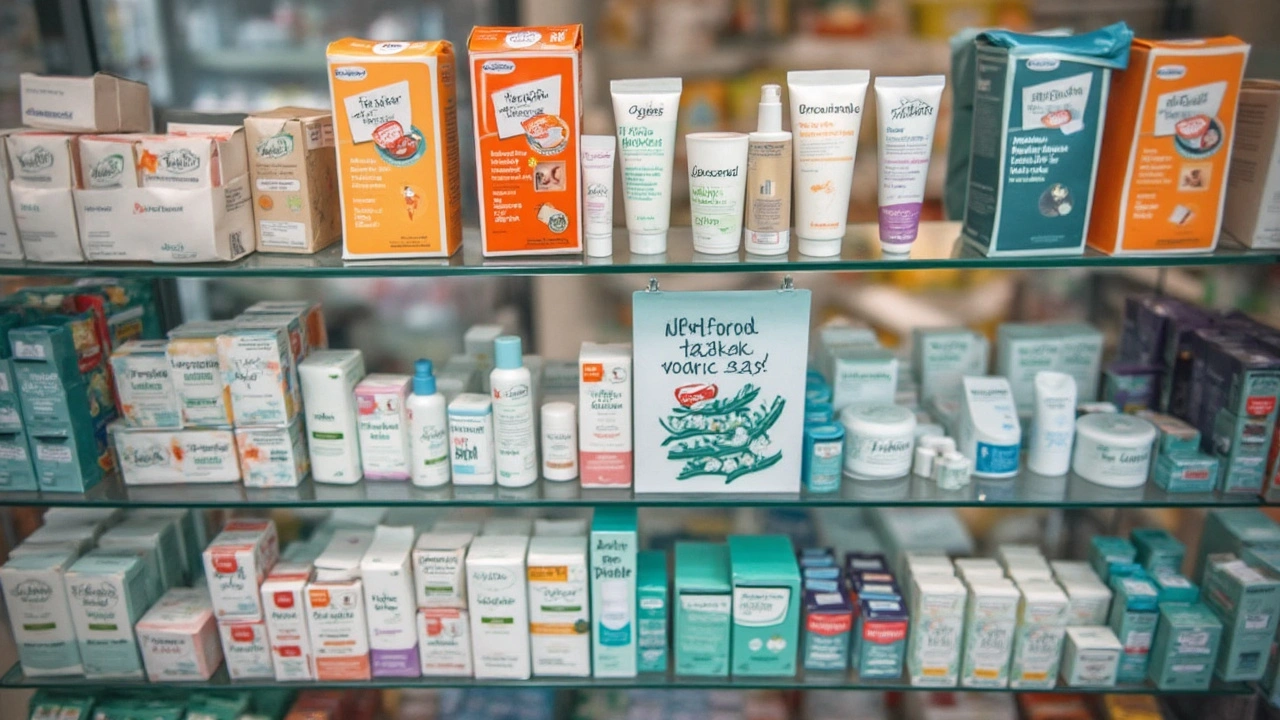Cold sores show up at the worst times—dates, interviews, holiday photos, you name it. They tingle, they itch, they strike out of nowhere, and suddenly you’re ransacking the bathroom drawer for anything that promises relief. While prescriptions like valacyclovir can seriously help, not everyone wants—or can get—a script. Maybe you’re avoiding the hassle. Maybe it’s the cost. Whatever your reason, you’re eyeing those over-the-counter options and wondering: are they worth it, or just shiny boxes with empty promises?
The Great Lysine Debate: Can This Amino Acid Really Stop Cold Sores?
Walk into any chemist or health store in Sydney, and chances are you’ll spot lysine supplements front and center in the “immune support” section. The story goes like this: lysine, an essential amino acid, somehow weakens the herpes simplex virus that causes cold sores. That’s the buzz, anyway. But how much science is really behind it?
Let’s break it down. Lysine isn’t made by your body; you get it from food or supplements. Some older studies found out that people who took lysine reported fewer cold sore outbreaks, and when they did flare up, the sores didn’t stick around as long. But dig a bit deeper, and it gets fuzzy: more recent research is split. Some trials say it helps. Others say it does nothing at all. The dose seems to matter. People popping below 1,000 mg a day didn’t see much difference, but folks taking higher dosages (like 3,000 mg daily) sometimes did spot shorter healing times. But high doses aren’t always safe—think stomach cramps, diarrhea, and on rare occasions, kidney issues. Not exactly what you bargained for to dodge a blister.
If you want to try lysine, don’t waste your cash on super low-dose tablets—the research just doesn’t back those up. And don’t think you can load up on cheese and call it medicine. While foods like eggs, yogurt, and fish are rich in lysine, supplements pack a punch not found in your average lunch. Just keep your GP in the loop before adding big doses—especially if you’ve got kidney problems.
Still, a chunk of cold sore sufferers say they swear by it. I’ve even seen mates at the pub sneak a lysine pill before ordering another round, just in case a tingle starts. Realistically, it’s not a miracle cure. But as an add-on to other treatments, it might be worth a shot during outbreaks—especially when you want something in your medicine cabinet until you get your hands on a stronger prescription.
Docosanol: The Pharmacy Staple that Promises Quick Healing
Let’s talk about docosanol, better known by its brand name, Abreva. Here in Australia (and plenty of other places), this is the only non-prescription topical cream that’s FDA-approved for cold sores. What’s the pitch? Docosanol claims to “shorten healing time and duration of symptoms if started early.” But does it really deliver?
This stuff is an alcohol derivative, and it works by messing with the virus’ ability to fuse into your skin cells. That means it tries to block the herpes virus before things get ugly. The trick is you’ve got to catch the cold sore super early—the second you feel that classic tingle. Wait too long, and you might as well just apply lip balm.
Clinical studies have shown that docosanol can speed up healing by roughly a day on average—sometimes two, if you’re especially lucky. The reality is, don’t expect miracles. You’re not going to slap it on an angry, full-blown blister and wake up clear-faced. But if you’re vigilant, notice the tingle, and keep that cream handy, you may cut your outbreak short. You won’t find much drama with side effects either—maybe some minor drying or redness at most.
I’d say docosanol gives you decent odds for a quick win if you’re the kind of person who feels the warning signs. My wife Adelaide is a big fan—she keeps a tube in every handbag. But if you wait until your cold sore looks like a science experiment, save the cash and stick to wound care basics.

Botanicals: Nature’s Cupboard or Just a Trendy Placebo?
If you scroll through wellness Instagram or stroll down the aisles at a Sydney farmers’ market, you’ll see a parade of botanical cold sore remedies promising “natural” relief. Tea tree oil, lemon balm, peppermint, echinacea, propolis… the list keeps growing. But are any of these worth the hype, or are we just paying premium prices for scented lip balms?
Let’s tackle a few standouts. Lemon balm (Melissa officinalis) has the strongest reputation. A handful of solid studies—mostly from Europe—found that applying lemon balm cream several times a day seemed to speed up healing and even helped stop recurrences for some people. The catch? Not every product labeled “lemon balm” is made with the right concentration or the tested extract, so you might get wildly different results depending on the brand.
Tea tree oil is another popular pick. It’s cheap, smells strong, and in lab studies, it’s shown antiviral activity against the herpes simplex virus. But concentrated tea tree oil can burn or irritate your lips, so if you go this route, dilute it to about 1:10 with a bland carrier oil. Never apply straight tea tree oil and expect a spa-like miracle.
Propolis, that sticky bee product used in fancy honey, shows some promise in early research for speeding up healing when used as an ointment. But allergy-prone folks beware—it can trigger reactions, especially if you tend to react to plants or bee stings.
Other botanicals like echinacea or peppermint oil crop up in “miracle” blends, but there’s just not enough solid science to put them at the top of your list. If you’re curious, try one product at a time so you can tell if anything’s actually helping (or just making things worse).
Nobody wants a cold sore, but even fewer people want to end up on the news for a wild allergic reaction. Patch test before slathering new botanical concoctions all over your lips.
What’s Hype and What’s Worth a Spot in Your Medicine Cabinet?
Now for the reality check. With so many options, it’s easy to fall for the latest trending remedy—especially when you’re desperate for relief. But here’s what’s actually worth considering, and what you might want to skip:
- Docosanol: A decent bet for those early tingle moments. Speedier healing, mild side effects, proven by some trials. Just don’t expect a miracle on day three of your outbreak.
- Lysine: Sketchy science, but higher doses might trim a day or two off your cold sore drama. Worth a try if you’re healthy, but check with your doctor first if you’ve got kidney issues.
- Lemon Balm: Strongest botanical evidence. If you can find a quality cream or ointment with the right extract, this is nature’s best bet for a gentle nudge on healing.
- Tea Tree Oil: Possible help, but only in low concentrations. Overdoing it can leave you with dry, cracked lips—never straight up from the bottle.
- Propolis: Promising, but allergy risk is real. Always patch test.
- Other Botanicals: Echinacea, peppermint, aloe, licorice—most claims here come from lab studies or word-of-mouth, not robust clinical trials.
If you’re weighing these against *valacyclovir OTC alternative* options, you might want to check out a more detailed breakdown at valacyclovir OTC alternative, which covers several approaches to managing cold sores—including some you might not find on pharmacy shelves.

Tried-and-True Tips to Get the Most Out of OTC and Natural Remedies
It’s not all about the product you pick—it’s also about timing, consistency, and common sense. Here’s how to up your odds of a quick recovery from cold sores, no matter which remedy you try:
- Jump into action at the very first tingle. Waiting for a full blister makes nearly everything less effective.
- Keep your lips protected—wind, sun, and dry air can all trigger outbreaks or slow down healing. Use a mild, non-irritating balm without any harsh flavors or scents.
- Wash your hands every time you touch your face or apply a cream. Otherwise, the virus can spread to other body parts (or, even worse, to other people—nobody needs that).
- Don’t double up on strong remedies. If you’re using lysine supplements, stick to the recommended dose—more isn’t always better. The same goes for tea tree or any other oil. Less is often more here.
- If you spot any swelling, pus, or fever, see a doctor straight away. Severe cold sores can look like other health problems and need medical attention, not just another layer of ointment.
- Consider keeping a “cold sore kit” in your bag—lyine, docosanol cream, lemon balm, and a soothing, unscented lip balm. That way you’re ready right at the first warning tingle—no frantic pharmacy dash required.
- If cold sores happen more than a few times a year, or if they’re seriously messing with your quality of life, talk to your doctor about a prescription approach. OTC and natural remedies are good starting points, but they’re not always enough for frequent or severe outbreaks.
I’ve tried half of these myself, just to see what actually helped versus what just stung my lips or cost too much for what I got. For me, catching the outbreak early always trumps getting caught up in the hunt for the next magic cream—so stash that tube of docosanol somewhere handy and pay attention to your stress triggers. Adelaide would remind you: you’re not alone, and it’s never vain to want your lips looking good at the family barbecue.




July 18, 2025 AT 10:26 AM
Honestly, the OTC options like lysine and docosanol get way more praise than they probably deserve. Lysine as an amino acid supplement sounds neat, but the clinical evidence supporting its efficacy is pretty shaky at best. It feels like people just latch onto it hoping for a miracle instead of relying on proven antivirals.
Docosanol is a bit more legit since it actually can block virus entry into cells, but it still isn’t near as potent as valacyclovir or acyclovir prescribed by doctors. And botanicals? Sure, they’re natural, but natural doesn’t always mean effective.
Don’t get me wrong, I get the frustration with pricey prescriptions, but sometimes you really do get what you pay for. Relying too much on OTC alternatives might leave someone stuck with prolonged or more severe outbreaks.
Would love to see more rigorous trials comparing these alternatives head-to-head with prescription meds before hyping them up.
July 21, 2025 AT 13:43 PM
I appreciate the breakdown provided here regarding lysine, docosanol, and botanical remedies for cold sore management. From a pharmacological standpoint, docosanol's mechanism as a fusion inhibitor is quite fascinating, yet its bioavailability and in vivo efficacy warrant further examination.
Moreover, the immunomodulatory potential attributed to certain botanicals, while promising in vitro, suffers from variability in constituent concentrations and lacks standardization. Consequently, translating these findings into reliable clinical outcomes remains a challenge.
It raises an interesting discussion about whether combination therapy incorporating both lysine supplementation and topical antivirals might offer synergistic benefits, albeit such protocols require robust randomized controlled trial data.
Has anyone else noticed significant differences with these OTC options compared to the conventional valacyclovir regimen? I'm curious about anecdotal experiences as well.
July 24, 2025 AT 11:43 AM
Thanks for sharing this info! Cold sores can be such a pain, and I know some people that would love cheaper options. Lysine and those herbal remedies seem super interesting, but I wonder how quickly they actually work when you feel the first tingle of an outbreak coming on.
I've heard docosanol creams can help shorten healing time a bit but not sure if it's worth using by itself every time. The natural stuff might be a good extra step but probably not a replacement for proper meds.
For anyone dealing regularly with cold sores, it’s gotta be frustrating why we don’t have better affordable options. Did the article mention any risks of relying solely on OTC treatments?
July 27, 2025 AT 09:43 AM
I’ve personally tried both lysine supplements and docosanol creams during cold sore flare-ups. Lysine seemed to help reduce frequency of outbreaks over months, but it wasn’t an immediate fix once a sore started.
Docosanol did seem to slightly cut down healing time and discomfort, but it’s subtle and you have to catch it early. The botanical stuff, in my view, was more of a placebo, though I’m open to being wrong if there’s actual evidence.
At the end of the day, the price tag on valacyclovir is rough, so I get why many prefer OTC routes. The article does a solid job laying out what realistically helps and what might just be hype.
July 30, 2025 AT 07:43 AM
Really enjoyed reading this article because it challenges how we automatically default to prescription meds for everything. We often overlook how natural alternatives like lysine, or traditionally used botanicals, hold their own value beyond purely biochemical effects.
There’s a philosophical angle here about how we perceive efficacy—if a botanical concoction offers comfort and empowerment, even partially through placebo, does that diminish its worth?
Yet, I agree that the science should guide us toward evidence-based care, but we shouldn't dismiss holistic approaches outright either. It’s about balance and personal responsiveness.
I’m curious if the article touched on combining these approaches thoughtfully rather than choosing exclusively?
August 2, 2025 AT 05:43 AM
The notion that lysine, docosanol, and botanicals serve as legitimate alternatives to valacyclovir demands scrutiny calibrated to clinical pragmatism rather than marketing allure.
The article presumably underscores the mucus membrane permeability challenges and pharmacokinetic constraints undermining topical agents. The systemic efficacy of lysine as an antiviral adjunct is plausible but not definitively demonstrated.
Scientifically, one might conclude these OTCs are adjunctive at best.
Optimal patient outcomes likely necessitate integrated protocols guided by practitioner expertise rather than sole reliance on self-medication.
August 5, 2025 AT 03:43 AM
Oh, I do love mixing a splash of color into the often drab world of OTC remedies! Lysine feels like that quirky sidekick—sometimes underestimated but quietly holding down the fort. The botanical remedies, meanwhile, bring a garden’s worth of magic with scents and soothing vibes that can’t always be quantified.
Yet, beneath their whimsical charm, you gotta ask: does this magic turn to tangible relief? It’s like the difference between an inspiring novel and a dry textbook. The article’s honest look is refreshing and necessary because, hey, we all want reliable help without empty promises.
For many, these choices may not just be physical but emotional lifelines in managing cold sores.
August 7, 2025 AT 22:56 PM
While I acknowledge the desire to circumvent costly medications, I must caution against accepting botanical remedies without rigorous scrutiny and peer-reviewed validation. Many so-called alternatives are rife with anecdotal endorsements lacking empirical substantiation.
The article's attempt to 'cut through hype' is commendable, but consumers must not be lulled into complacency by misleading marketing or placebo effects masked as genuine relief.
It is paramount to consult healthcare professionals before deviating from established therapeutic regimens, especially those with proven antiviral efficacy.
August 10, 2025 AT 18:09 PM
ugh. cold sores are the worst, man. i’ve tried so many things, from herbal balms to whatever docosanol creams but nah, the sores still show up like clockwork. it’s frustrating when you hear 'natural stuff works!' but then the flare just ruins your vibe.
sometimes it feels like a cycle you can’t break, ya know? maybe it’s all in the head. idk. anyone else feel like OTC stuff is just throwing money at hope?
August 13, 2025 AT 13:23 PM
From my experience in clinical pharmacology, the lack of robust antiviral activity in lysine demands skepticism; although it may marginally influence mucosal immunity, it lacks direct virucidal properties.
Docosanol's aliphatic chain length facilitates membrane fusion inhibition, yet its moderate efficacy situates it distinctly below nucleoside analogs like valacyclovir in potency.
The botanical compounds present a complex pharmacognostic challenge due to the heterogeneity of their phytochemical constituents and poor standardization, limiting replicable therapeutic effects.
Nevertheless, integrating these OTC options could have a minor role in a comprehensive cold sore management plan, particularly for prevention or adjunctive symptomatic relief.
August 16, 2025 AT 16:56 PM
I've always been skeptical about just relying on OTC stuff, but I've gotta admit, having some options like lysine and docosanol gives people a bit of hope when prescriptions aren’t accessible.
Sometimes, even small effects matter. Like maybe the healing time is cut by a day, or the pain eased slightly, and that makes a huge difference if messed with often.
It's cool the article shares the science behind it, so people can make informed choices rather than scrambling blindly.
Anyway, peace of mind counts for a lot, even if it’s just from natural or cheaper alternatives.
August 17, 2025 AT 10:09 AM
Quick follow-up: have any of you experimented with dosing schedules for lysine that might optimize its plasma levels for antiviral effects? The standard oral supplements vary greatly in bioavailability, which likely muddles outcome consistency.
Additionally, combining docosanol with immunomodulating botanicals could theoretically create synergistic barriers at viral entry points and host defense—but without controlled studies, this is speculative.
It’d be great to crowdsource anecdotal titration data to identify promising real-world protocols to inform future trials.